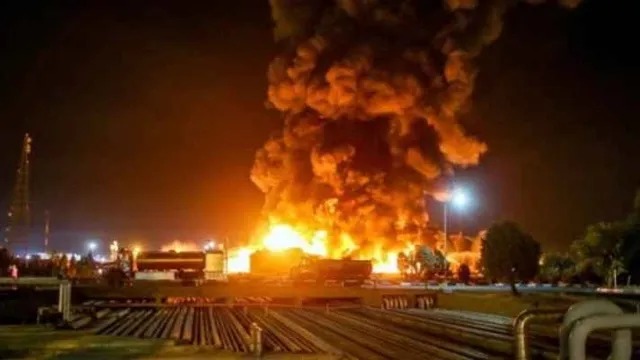Two explosions rocked Iran’s main south-north gas pipeline network on Wednesday, leading to widespread concerns over potential sabotage.
Iranian Oil Minister Javad Owji confirmed the deliberate nature of the blasts during an interview with state TV, although refrained from specifying any potential perpetrators.
The incidents, reminiscent of a 2011 sabotage attack that disrupted gas supplies across multiple regions, raised alarm across the nation.
However, authorities swiftly moved to alleviate fears, denying reports suggesting widespread gas cuts to industries and offices in several provinces.
Contrary to initial concerns, only villages in proximity to the damaged pipeline were affected by gas outages. Minister Owji assured the public that repair works were already underway and anticipated a resolution by the end of the day.
State media indicated that temporary restrictions had been anticipated due to scheduled maintenance, further downplaying the impact of the explosions.
This isn’t the first time Iran has faced such acts of sabotage. In 2017, Arab separatist militants claimed responsibility for blowing up two oil pipelines in Khuzestan province.
The recurrence of such incidents underscores the persistent threat of subversive activities targeting Iran’s critical infrastructure.
The recent explosions reignited memories of a shadowy conflict between Iran and Israel, characterized by accusations and denials of clandestine attacks.
In December, Iran executed five individuals, alleging their involvement in sabotage activities with ties to Israel’s Mossad intelligence agency.
These executions were part of a broader narrative of a decades-long covert war, where Iran has repeatedly accused Israel of orchestrating assaults on its nuclear and missile programs.
While tensions between Iran and Israel have simmered for years, such overt acts of sabotage add a dangerous dimension to their already fraught relationship.
With neither side willing to confirm or deny their involvement in such operations, the region remains on edge, wary of the potential escalation of hostilities.
The explosions along Iran’s gas pipeline network serve as a stark reminder of the vulnerabilities inherent in modern societies heavily reliant on critical infrastructure.
As investigations into the sabotage continue, questions linger over the motives behind such brazen acts and the potential repercussions for regional stability.
For now, Iran remains resolute in its determination to restore normalcy to its gas supply chain while vigilantly guarding against future threats to its national security.
However, the spectre of sabotage looms large, casting a shadow of uncertainty over the future of Iran’s energy infrastructure and the broader geopolitical landscape of the Middle East.
This article was created using automation technology and was thoroughly edited and fact-checked by one of our editorial staff members

